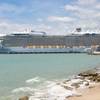IMO's Strategic Plan for the next six years and High-level Action Plan for the next two years were updated by the Organization's highest governing body, the Assembly, when it met for its 25th regular session from 19 to 30 November, 2007. The Assembly also approved the Organization's budget for the next two years, elected a new Council, confirmed the re-appointment of Secretary-General Efthimios E. Mitropoulos for a further term and adopted a wide range of technical and other resolutions.
IMO's high-level action plan sets out in detail the planned "outputs" for the biennium and links them to the six-year strategic plan. The new strategic plan supersedes the previous version, and identifies strategic directions that will enable IMO to achieve its mission objectives in the years ahead. Among the new challenges for IMO in the updated plan are to place a greater emphasis on contributing to international efforts to reduce atmospheric pollution and address global warming, and to contribute to the achievement of the Millennium Development Goals (MDGs).
The Assembly also approved the Organization's budget for the next biennium, agreeing to a total appropriation of £54,669,300 for the 2008-2009 biennium, comprising £26,799,300 for 2008 and £27,870,000 for 2009.
The decision of the Organization's Council to extend the appointment of Secretary-General Mitropoulos for a further term of four years, for the period 1 January 2008 to 31 December 2011, was unanimously confirmed. (See Briefing 49/2007.) The newly elected IMO Council for 2008-2009 (see briefing 45/2007) met on Friday 30 November and re-elected, by acclamation, Mr. Johan Franson (Sweden) as its Chairman and Mr. Dumisani Ntuli (South Africa) as Vice-Chairman.
Earlier, the Assembly had adopted resolution A.1000 on implementation of part (c) of article 17 of the IMO Convention, with a view to ensuring that the IMO Council is representative, balanced, diverse, efficient and supportive of the interests of the whole membership.
Wide range of resolutions adopted
Altogether, twenty-two resolutions were adopted by the Assembly, which was attended by some 1,000 delegates from IMO Member States as well as international and non-governmental organizations. They covered a broad spectrum of topics, including piracy in waters off the coast of Somalia, technical co-operation, ballast water management, fishing vessel safety and voyage planning in remote areas.
Piracy off the coast of Somalia
The Assembly adopted a resolution on piracy and armed robbery against ships in waters off the coast of Somalia, which, among other things, requests the Transitional Federal Government of Somalia to advise the UN Security Council that it consents to warships or military aircraft entering its territorial sea when engaging in operations against pirates or suspected pirates and armed robbers. (See Briefing 47/2007.)
Technical co-operation
A resolution on the linkage between the Integrated Technical Co-operation Programme (ITCP) and the Millennium Development Goals (MDGs) was adopted, which includes mechanisms to enable Member States to analyse and assess their progress in developing maritime capacity, over time. It requests the Technical Co-operation Committee to give high priority to activities that not only promote the early ratification and effective implementation of IMO instruments but also contribute to the attainment of the MDGs, taking into account the special needs of the Least Developed Countries (LDCs) and Small Island Developing States (SIDS), and the particular maritime transport needs of Africa.
The related resolution A.998, on the need for capacity-building for the development and implementation of new, and amendments to, existing instruments, recommends that IMO establishes mechanisms to identify the capacity-building needs of developing countries and provide any related technical assistance when considering the introduction of new IMO instruments or amendments to existing ones.
Implementation of Mandatory IMO instruments
The Assembly adopted a revised Code for the Implementation of Mandatory IMO Instruments, 2007, which serves as the audit standard for the Voluntary IMO Member State Audit Scheme. The revised Code updates that adopted in 2005, to take into account amendments to mandatory IMO instruments which have entered into force or become effective since then.
Ballast water management
Resolution A.1005(25) Application of the International Convention for the Control and Management of Ships' Ballast Water and Sediments, 2004 was adopted to provide certainty and confidence in the application of the BWM Convention, thereby assisting shipping companies, ship owners, managers and operators, as well as the shipbuilding and equipment manufacturing industries, in the timely planning of their operations.
The resolution addresses concerns over implementation of the Convention for vessels constructed in 2009, given the uncertainties as to whether type-approved technology would be immediately available for these ships. It allows for certain new ships built in 2009 to be exempted, if such technologies are not available, and calls on States, which have not yet done so, to ratify, accept, approve or accede to the Convention as soon as possible.
Fishing vessel safety
The Assembly adopted a resolution on the entry into force and implementation of the 1993 Torremolinos protocol, which reiterates the need for Governments to consider ratifying, accepting, approving or acceding to the Torremolinos Protocol at the earliest possible opportunity, so that this international Convention covering fishing vessel safety can enter into force. The IMO Assembly remains convinced that the entry into force of the Torremolinos Protocol would make a significant contribution to maritime safety in general (and that of fishing vessels in particular) and also that the continuing and alarmingly high number of fishermen's lives and of fishing vessels reportedly lost every year could be substantially reduced by the global, uniform and effective implementation of the Protocol.
To that end, the Assembly endorsed the decision of the Maritime Safety Committee to explore further the legal and technical options to facilitate and expedite the Protocol's entry into force, which were previously recommended by the Joint FAO/IMO Ad Hoc Working Group on Illegal, Unregulated and Unreported Fishing and Related Matters.
Voyage planning in remote areas
A resolution on Guidelines on voyage planning for passenger ships operating in remote areas, was adopted, in response to the growing popularity of cruise ships sailing to new destinations, some of which are at considerable distances from search and rescue facilities.
This new IMO initiative comes in the aftermath of the adoption, by the Organization's Maritime Safety and Marine Environment Protection Committees, in December 2002, of Guidelines for ships operating in Arctic ice-covered waters. (See also Briefing 46/2007.)
Subscribe for
Maritime Reporter E-News
Maritime Reporter E-News is the maritime industry's largest circulation and most authoritative ENews Service, delivered to your Email five times per week










